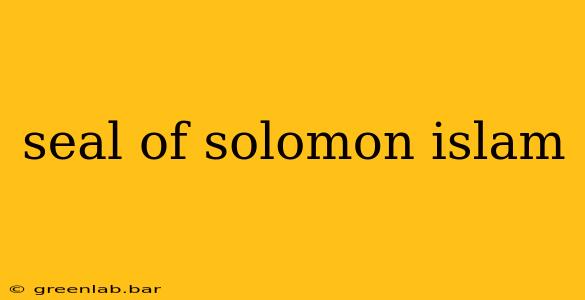The "Seal of Solomon" is a potent symbol with a rich and complex history, spanning various cultures and religions. Its association with Islam, however, is often misunderstood, shrouded in myth and misinterpretation. This article aims to clarify the Seal's significance within an Islamic context, separating fact from fiction.
Understanding the Seal of Solomon's Origins
Before delving into the Islamic perspective, it's crucial to understand the symbol's broader origins. The Seal of Solomon, traditionally depicted as a six-pointed star (hexagram) or a pentagram, is associated with King Solomon, a revered figure in Judaism, Christianity, and Islam. In these traditions, Solomon is credited with wisdom, power, and control over jinn (spirits). The seal itself is often believed to have been a magical device granting him these abilities. The imagery varied across cultures and time periods, and the specific interpretations differed greatly.
The Seal of Solomon in Islamic Literature and Tradition
While Islamic texts mention Solomon (Sulayman) extensively, portraying him as a prophet blessed with immense wisdom and dominion over nature, the specific depiction of a "Seal of Solomon" as a magical amulet or talisman is largely absent from authentic Islamic sources. The Quran and Hadith (sayings and traditions of the Prophet Muhammad) focus on Solomon's piety, justice, and divinely bestowed abilities, not on a physical artifact granting him power.
Misinterpretations and Misattributions
Many misconceptions surrounding the Seal of Solomon in Islam stem from:
- Folklore and Popular Culture: Numerous tales and legends, often originating outside of mainstream Islamic scholarship, depict the Seal as a powerful amulet used for protection, summoning spirits, or performing magic. These narratives, while fascinating, don't reflect the orthodox Islamic understanding of Solomon or the nature of divine power.
- Conflation with Other Symbols: The six-pointed star, often associated with the Seal of Solomon, holds various meanings in different traditions. Its appearance in Islamic art doesn't automatically equate it to a specific "Seal of Solomon" with magical properties. Its use could be purely decorative or represent other symbolic meanings within Islamic aesthetics.
- Misunderstanding of Jinn: The Islamic understanding of jinn emphasizes their submission to God's will. While Solomon controlled jinn, this control was a manifestation of God's power bestowed upon him, not the result of some magical artifact.
The Importance of Authentic Islamic Sources
It's imperative to rely on authentic Islamic sources—the Quran, Sunnah (the Prophet's practices), and scholarly interpretations—when exploring religious symbolism. Interpretations based on folklore or unsubstantiated claims can lead to misconceptions and potentially harmful practices. Any purported magical use of the "Seal of Solomon" contradicts core Islamic principles.
Conclusion: Separating Fact from Fiction
The "Seal of Solomon" in the context of Islam is largely a matter of misinterpretation and misattribution. While Solomon's story is celebrated for its emphasis on divine power and wisdom, the concept of a physical "Seal" granting magical abilities isn't supported by authentic Islamic sources. Understanding the nuances of Islamic tradition and relying on reliable scholarly resources is crucial for avoiding misconceptions and appreciating the true meaning of religious symbols. The focus should always remain on the divine power and wisdom highlighted in the Quran and Hadith, not on potentially misleading folklore.

